October 15, 2014
Edited by David Sanders
Specimen Days
70 BC – Virgil, (Publius Vergilius Maro) Andes, Cisalpine Gaul, Roman Republican poet (Aeneid), (d. 19 BC), is born.
1595 – Abu al-Faiz ibn Mubarak Faizi, Persian-Dutch E indies poet, dies at 48.
1674 – Robert Herrick, Mass, British poet (Together), is born.
1686 – Allan Ramsay, Scottish poet (d. 1758), is born.
1859 – Jaime de Magalhes Lima, Portuguese author/poet (Salmos do Prisoneiro), is born.
1837 – Ivan Dmitriev, Russian statesman and poet (b. 1760), dies.
1932 – Riekus Waskowsky, poet, is born.
2008 – Fazıl Hüsnü Dağlarca, Turkish poet (b. 1914), dies.
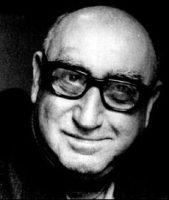
In the forest syllable by syllable
Leaves gave you the mighty darkness.
Your body stood Night by night beyond beauty.
Why say dreams are white?
Have you ever slept the sleep of death?
Shadows grew into the winds.
Brooks
And birds scuttled through your land.
Desolate lay the village road. Why say your loved ones are gone?
Have you ever slept the sleep of death?
—from “Grave Question” by Fazıl Hüsnü Dağlarca (1914–2008)
World Poetry
Chinese Poet Faces Jail for Possession of Umbrella

A Chinese poet is facing up to three years in prison after security forces raided his Beijing home and found him in possession of an umbrella. Until last month, when major pro-democracy protests broke out in Hong Kong, the umbrella was generally viewed as a useful device to shield oneself from rain or sun. More.
'Graffiti' Left on Snowdon Mountainside by National Theatre Wales – After Poem which was Supposed to Wash Away Ends up Baked on to Rock

September sunshine has baked what was supposed to be a temporary poem on a Snowdonia mountainside into a permanent ‘graffiti’ feature. The 100ft poem was written by Wales’s national poet Gillian Clarke and scribed in clay pigment on the rock. More.
Keeping America Safe from Foreign Poets
“Poetry can be dangerous,” Rumi said, and U.S. Homeland Security isn’t taking any chances. The Jordanian-British poet Amjad Nasser had been invited to speak at New York University this fall, but on Sept. 27, he was questioned for two hours at London’s Heathrow airport and then prevented from flying to the United States. More.
Recent Reviews
Paper Aeroplane: Selected Poems 1989-2014 by Simon Armitage, Review: 'colloquial and unpretentious'
by Charlotte Runcie
Is Simon Armitage the closest thing that modern Britain has to a medieval bard? In the past few years he has taken to ranging across the countryside on extended walking trips, paying for his food and lodgings with a series of verse readings. It’s a throwback to the days when a poet was something akin to a travelling entertainer, and probably much more welcome at parties than your average open- mic regular is today. More.
Accepting the Disaster
by Anthony Domestico
Accepting the Disaster, Joshua Mehigan’s superb new collection of poetry, begins with a poem called “Here.” More.
Ezra Pound: Poet, the Epic Years by A David Moody, review: 'masterly'
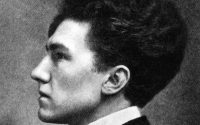
In the second volume of the definitive Life of Pound, the poet flirts with fascism
By Jeremy Noel-Tod
'Il miglior fabbro” (“the better craftsman”) T S Eliot called Ezra Pound in the dedication to The Waste Land (1922). As editor, Pound had red-penned Eliot’s sprawling drafts into a great modernist poem. The famous exchange occurs in the opening chapter of Ezra Pound: Poet, the Epic Years, the second volume of A David Moody’s definitive biography. Returned to the context of Pound’s life at the time, one wonders if Eliot’s tribute was not also a gentle tease. More.
Blackness Visible
by Jonathan Farmer
Few words echo as far and fast as racist. Amid so much supposedly race-neutral language, it lands with a violent unreality, uprooting both subject and speaker. Claudia Rankine said as much in her speech at the 2011 AWP conference, and she was right: That talk created an immediate sensation, one that continues to shape responses to both Rankine and the poet she described in that lecture, her former colleague Tony Hoagland. More.
Book Review: Seven New Generation African Poets
Mike Puican
This is a beautifully assembled, boxed set of seven chapbooks by emerging poets relatively new to non-African audiences. The project was first envisioned by the African Poetry Book Fund, an organization dedicated to publishing poetry from Africa. Its goal was to increase the exposure of distinctive, modern African voices. With support from the Poetry Foundation and Prairie Schooner, and acceptance by U.S. publisher Slapering Hol Press, the collection became a reality. More.
Breaking Bad
The Outlaw Stylings of Brock-Broido, Cushman, and Wright
By Lisa Russ Spaar
Poetry is broken language. Even in its “prose” incarnations—proems, prose poems—when lineation is not formally observed, poetry works the break. It interrupts, truncates, burglarizes. Poetry ruptures and ameliorates. Hardly ever housebroken, it often acts as a breaker box for the incendiary currents coursing through us. Poems break hearts. They break the news, however difficult. Rarely garnering for their makers fame and fortune, poems may nonetheless embody—in their breaching and bridging of the large distances—a stroke of luck, a stroke of mercy. More.
Broadsides
Mark Strand, On Not Forgetting A Poem
When I went to Brazil in 1965 as a Fulbright Lecturer I had read only a few of Carlos Drummond de Andrade’s poems in translations done either by Elizabeth Bishop or John Nist. I did not know Portuguese and thought quite erroneously it turned out that I would learn it by doing my own translations. I had no idea how difficult that would be. Relying heavily on my limited knowledge of Spanish, I was eventually able to read it, but never able to speak it with anything approaching fluency. My translations had to be checked for accuracy by someone who actually knew the language. More.
Brief Reflections on the Poetry of Allen Grossman

by Michael Young
Allen Grossman died in June this year and it returned me to his poetry. He is the kind of poet our time needs but rarely acknowledges. Grossman received a 2009 Bollingen Prize, one of those high honors that only other poets know about. He didn’t receive the more obvious Pulitzer or National Book Award. But, then again, prophets and prophet-poets don’t open their mouths to receive accolades. More.
Flowers of Kitsch: on Pound, New Critics and Conceptualisms
by Johannes
I’ve been working on my critical book Atrocity Kitsch so I haven’t had a chance to blog very much recently, but I thought I would add some ideas about kitsch and poetry that won’t be in the book. In Silver Planet, Daniel Tiffany writes about that incredibly work of atrocity kitsch, Ezra Pound’s Cantos:
“The integrity of the poem’s experiment could be salvaged only by isolating (and purifying) its formalist agenda, which meant that the appeal and function of kitsch in the Cantos could not even begin to be acknowledged, debated, or tested. The emergence of so called late modernism – a mandarin, hyper-formalist variant of the original movement – suppressed any discussion of the possibility that the diction of the Cantos alternated, in fact, between the “silver”y substance of kitsch and the “hard” phrasing of modernism.” More.
Our Lady of the Telephone and the Palestinian Poet
by Michael Harding
There is a cocktail called a Tornado. And I know a woman with three children who describes the pain of childbirth as a tornado. And love can often feel like a tornado scattering the equilibrium of the human heart. But it’s the warplanes that offend me; the ones that reach into Arabia with bombs for the Islamic state, and are called Tornadoes. I suppose words are slippery little fish; they can be used like a knife to kill the poetry in anything. More.
Drafts & Fragments
Watch Elijah Wood in the World Exclusive Trailer for Dylan Thomas Film Set Fire to the Stars
Elijah Wood stars in Andy Goddard's movie as John Brinnin, an aspiring poet who oversees Dylan Thomas's first tour to America in 1950. Celyn Jones plays Thomas, with support from Shirley Henderson and Kelly Reilly – as well a soundtrack by Gruff Rhys. More.
9 October (1927): Federico Garcia Lorca to Sebastian Gasch
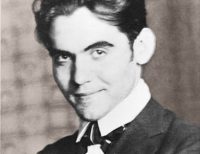
[Fall, 1927]
Everyday I appreciate Dalí’s talent even more. He seems to me unique and he possesses a serenity and a clarity of judgment about whatever he’s planning to do that is truly moving. He makes mistakes and it doesn’t matter. He’s alive. His denigrating intelligence unites with his disconcerting childishness, in such an unusual combination that it is absolutely captivating and original. More.
Poetry In the News
Walt Whitman Birthplace to Get Poet's Historic Family Bible

The historians at the Walt Whitman Birthplace knew about a Bible that the famed poet had inscribed with details of his family's births, marriages and deaths. But they didn't know who had it until a descendant called and offered to donate the massive volume. More.
A Terrific Beginning

On Thursday, September 25th, Charles Wright officially began his term as the 20th Poet Laureate Consultant in Poetry at the Library of Congress with a reading in the historic Coolidge Auditorium. There was a host of media coverage before and after the reading. More.
Early, Unseen Szymborska Poems Hit the Shelves

Nobel literature laureate Wislawa Szymborska’s earliest poems will hit the shelves today in her native Poland in a posthumous collection of mostly never-before-seen work, her publisher said. The “Black Song” collection features poems of varying quality written by the 1996 Nobel laureate when she was just starting out in the 1940s, according to Znak publishing house chief Henryk Wozniakowski. More.
Pulitzer Prize-winning Poet Carolyn Kizer is Dead at 89

Carolyn Kizer, who won the Pulitzer Prize in poetry for her 1985 collection "Yin" and served as the first literature director of the National Endowment for the Arts as well as founding editor of Poetry Northwest, died Thursday in Sonoma, Calif., at 89 of age-related dementia. More.
New Books
Splitting an Order by Ted Kooser
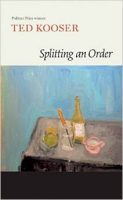
[Hardcover] Copper Canyon Press, 96 pp., $23.00
Pulitzer Prize winner and best selling poet Ted Kooser calls attention to the intimacies of life through commonplace objects and occurrences: an elderly couple sharing a sandwich is a study in transcendent love, while a tattered packet of spinach seeds calls forth innate human potential. This long-awaited collection from the former U.S. Poet Laureate—ten years in the making—is rich with quiet and profound magnificence.
In a Landscape by John Gallaher
[Paperback] BOA Editions Ltd.,128 pp., $16.00
Falling somewhere between a "diary-poem," a "daybook," "autobiography-in-verse," and an "essay-poem," In a Landscape is noted poet and critic John Gallaher's most personal, straightforward, and revealing book yet. In lyric-prose that continuously circles the questions it raises, Gallaher sloughs off the garb of "poet" to address life questions in a way that few poets of his generation have been willing to risk. Family, death, adoption, children, parents, high school, music . . . Gallaher's subjects carry weight because of their absolute commonness.
Habitation: Collected Poems by Sam Hamill
[Paperback] University of Washington Press, 410 pp., $25.00
Habitation collects the best poetry from a career spanning more than forty years by the distinguished northwest poet-editor-translator, Sam Hamill. Drawn from fifteen volumes of celebrated poetry, whether in brief haiku-like poems or long-ranging narratives, Habitation presents a lyrical voice is unique in American poetry today. Jim Harrison has declared, "Hamill has reached the category of a National Treasure," and Hayden Carruth has written, "[His] poetry is no less than essential."
Wunderkammer by Cynthia Cruz

[Paperback] Four Way, 72 pp., $15.95
Within the world of Wunderkammer, or “cabinet of curiosities,” Cynthia Cruz archives the ruinous, the sparkling, the traumatic, and the decadent. These poems, through sensuous impressions, mimic what it’s like to wake from a dream only to realize you are still inside the dream. We encounter gluttony pinned against starvation—“ceiling high cream cakes, / I ran twelve miles in my ballet leotard” — and the glamorous mixed with the grotesque —“I follow a sequin / Thread of dead things.” Through “brutal music,” Wunderkammer grips at the edges of memory and chaos; these poems have “found the kill / And entered it.”
Inscriptions by Cammy Thomas
[Paperback] Four Way, 72 pp., $15.95
A meditation in the face of impermanence, Inscriptions is a book about a family in crisis. Three strong women—a mother, an aunt, and a sister-in-law—serve as focus for the collection as these compressed lyric poems wrestle with illness and “death,/ tangy as copper” and the ways in which they reshape a family. Thomas seeks consolation in what endures, discovering a sense of what's sacred in the ordinary.
All the Wasted Beauty of the World: Poems by Richard Newman
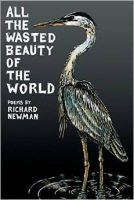
[Paperback] Able Muse Press, 102 pp., $18.95
All the Wasted Beauty of the World, a finalist for the 2012 Able Muse Book Award, extols the beautiful as readily as it expounds on the blemished. The reasoned commingles with the rambunctious, as in the case of the speaker who declares that “our lives span diaper to diaper,/ and in between we piss on anyone/ we can.” Little escapes notice in these poems of gutsy realism and formal deftness, which freely highlight the fringes of society—the speaker in “Bellefontaine Cemetery” exhorts teens to “party on people’s graves” and have “a few close shaves with county sheriffs,” the carcass of a Ford truck intrudes on a hiking trail’s gully, the homeless are lullabied to “find rest behind our dumpster/ . . . score a fifth of bourbon/ and find your stomach full.” Richard Newman brings us a collection that prods and soars with the grit and beauty of the real world.
Correspondences
Jaundiced Reality: Simon Armitage Interviewed

by Alex MacDonald
Recent Poetry School Digital Poet in Residence and Selected Poems editor Alex MacDonald speaks to one of the most recognisable names in British poetry, Simon Armitage, about the undercurrent of violence in his work, the perils of being a Northern Poet and his new book of selected poems, Paper Aeroplane. More.
A Conversation with Poet and Editor David Lehman

By Thirsty
David Lehman is the Series Editor of The Best American Poetry, a position he has held since he founded the series in 1988, edited The Oxford Book of American Poetry and has written or edited over twenty volumes. His work has been translated into sixteen languages and his latest book of poetry, New and Selected Poems, was called "Inventive and often winningly sincere…" by Robert Pinsky. His latest edition of The Best American Poetry 2014 was recently released and has received glowing reviews. His poems, essays and stories have appeared in The New Yorker, The New York Times Magazine, The Wall Street Journal, The American Scholar and People, among many others. He has received fellowships and awards from the Guggenheim Foundation, the American Academy of Arts and Letters, the National Endowment for the Arts, the Ingram Merrill Foundation and the Lila Wallace – Reader's Digest Fund and he teaches in the graduate writing program at the New School, a position he has held since 1996. THIRSTY was honored to spend time with David Lehman in New York City for this conversation. More.
Envoi: Editor’s Notes
Lessons from the Past: John Keats

[ . . . ] We hate poetry that has a palpable design upon us—and if we do not agree, seems to put its hand in its breeches pocket. Poetry should be great & unobtrusive, a thing which enters into one’s soul, and does not startle it or amaze it with itself but with its subject.—How beautiful are the retired flowers! how would they lose their beauty were they to throng into the highway crying out, ‘admire me I am a violet! dote upon me I am a primrose!
—from A Letter to J. H. Reynolds, 3 February 1818